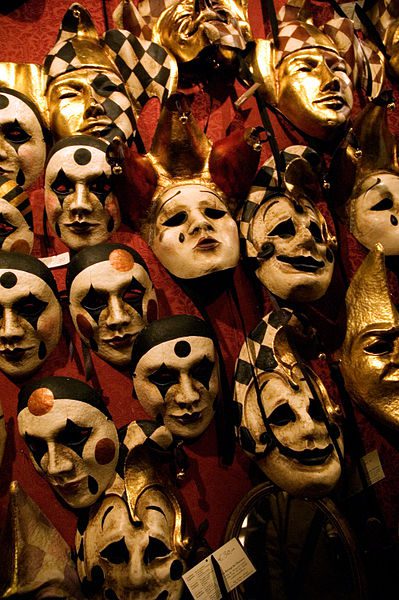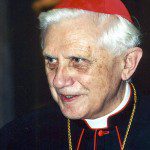
Venice carnival masks (February 2008. Photo by “Dagoos” [Wikimedia Commons / Creative Commons Attribution-Share Alike 2.5 Generic license]
***
As any conscious person who follows Catholic affairs at all, knows, there seems to be a constant uproar and “buzz” about this, that, or the other thing that the Holy Father said. One of my friends claimed that Pope Francis’ shortcomings were the cause, and asked my opinion about it. The following was my reply (expanded for this article):
1) I think (with all due respect and deference) that the pope would benefit and help things by being more careful in his public statements, knowing that they have been systematically misrepresented.
2) The pope could (preferably) be more articulate and verbally careful, even given the fact that this aspect is greatly over-exaggerated.
3) That said, the division and confusion has been cultivated primarily (beyond the causes in #1 and #2, wherever they occur) by media misrepresentation, fueled enormously by heterodox, modernist, so-called “progressives” in the Church, who (mistaking them for truth) love these misrepresentations, which imply that Pope Francis is a theologically liberal revolutionary; and radical Catholic reactionaries (quasi-schismatic fringe elements on the far “right”), who despise the same distortions, also thinking they are true.
4) Because of the scenario in #3 relentlessly occurring these past three years, now many others have jumped on the “bandwagon” because of the false (or at best grotesquely distorted) “narrative” having been created, so that now, many legitimate traditionalists (always tending to be critical of the pope), and non-traditionalist orthodox Catholics (my category) are bashing the pope or criticizing him on a regular basis.
Some of that criticism is or could arguably be legitimate (back to #1 and #2), but the vast bulk of the criticism as a whole is not.
5) Now, on what basis do I have this opinion? It’s because, as a full-time apologist, I have defended Pope Francis for over three years and have seen firsthand, how much distortion is taking place: how many bum raps. I wrote a book about it two-and-a-half years ago (Pope Francis Explained), in which I stated my central thesis (basically, #3). I’ve seen no reason to change it in the interim.
My book only touches the tip of the proverbial iceberg. I have also compiled 252 articles, as of writing, which defend the pope and explain things that he did or said, or supposedly did or said. This is called, “Pope Francis Defended: Resources for Confused or Troubled Folks” .
I have studied many of these claimed instances of error in depth; close-up. And I don’t believe that Francis was at fault in the vast majority of cases (at least the ones that I have studied). In the few cases where I agree that he was to blame to some extent, I think he was not as seriously at fault as folks made out.
Generally, the false accusations fall under one of three categories: wildly taking the Holy Father’s words out of context (“who are we to judge?” is the classic example), misinterpreting them by not understanding the genre (which happens to the words of Jesus all the time; such as when He uses hyperbole and people take it literally), and cases of outright mistranslation of the Italian.
One time a person was attacking the pope, based on one word that he supposedly said, which would have had a horrible and shocking interpretation. I proved (with the help of an Italian friend) that the key word under consideration was mistranslated and that the original word’s meaning was nowhere within a universe of what the critic had claimed. He was forced to concede the point due to the force of evidence.
The vast majority of the criticism out there (and I know, having closely examined much of it), is illegitimate. Spreading such charges around is scandalous, if in fact (as I contend) the criticism is wrongheaded, mistaken, factually out to sea, etc.
Everyone has a choice to make: whether we will listen to the slant of the secular media and those on the far right and left wings of the theological spectrum, or at least take into consideration, defenses of the Holy Father, written by orthodox Catholics, who accept his authority and charism from God.
Blessed John Henry Cardinal Newman (the man most responsible for me becoming a Catholic), preaching at the Birmingham Oratory in 1866 on “our obligations to the Holy See,” said:
[W]e must never murmur at that absolute rule which the Sovereign Pontiff has over us, because it is given to him by Christ, and, in obeying him, we are obeying his Lord. We must never suffer ourselves to doubt, that, in his government of the Church, he is guided by an intelligence more than human. His yoke is the yoke of Christ, he has the responsibility of his own acts, not we; and to his Lord must he render account, not to us.
. . . Our duty is . . . to follow him whither he goeth, and never to desert him, however we may be tried, but to defend him at all hazards, and against all comers, as a son would a father, and as a wife a husband, knowing that his cause is the cause of God.
Lastly, some seem to think that all the pope-criticism is a new phenomenon. It’s not at all, and again, I know that firsthand, because I was out there defending Pope St. John Paul II against a mountain of criticism (some of it from my own friends). People despised his ecumenical Assisi conferences, thinking they were indifferentist, and thought he was a loose cannon, especially in his later years. Some falsely accused him of universalism.
Nor was Pope Benedict XVI immune. A well-known Catholic writer and producer of many videos recently claimed that he exaggerated his illness in order to retire, which act was “immoral” and an abandonment of the Catholic flock.
Outrageous! Flee from the diabolical spirit of calumnious gossip!
*****
Meta Description: My summarized view of the causes and blame for all the uproar constantly surrounding Pope Francis.
Meta Keywords: allowable Catholic dissent, criticism of the pope, Pope Francis, pope-bashing, Radical Catholic Reactionaries, Traditionalism, papolatry, ultramontanism, Ferrara, Skojec, Hilary White













